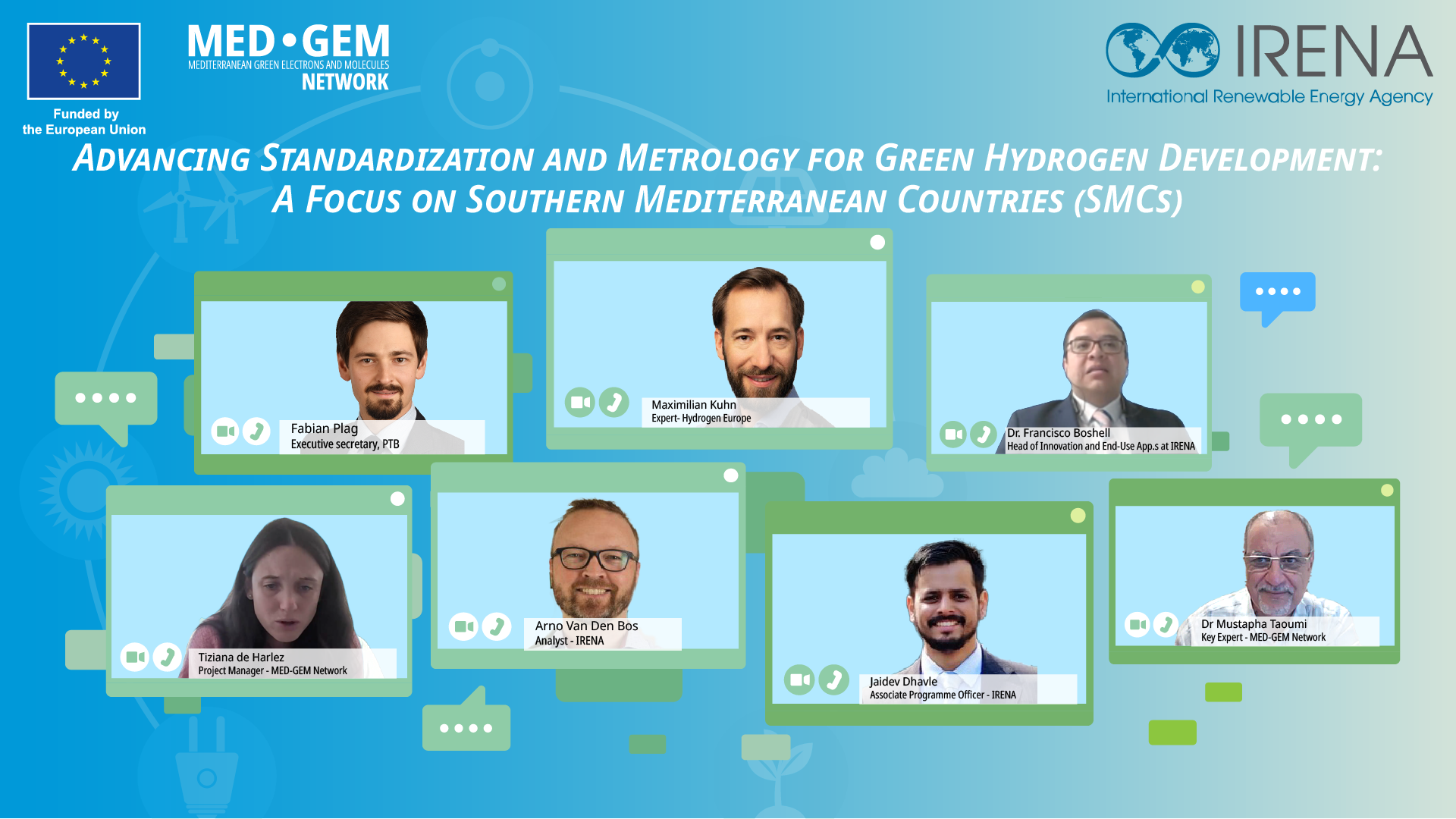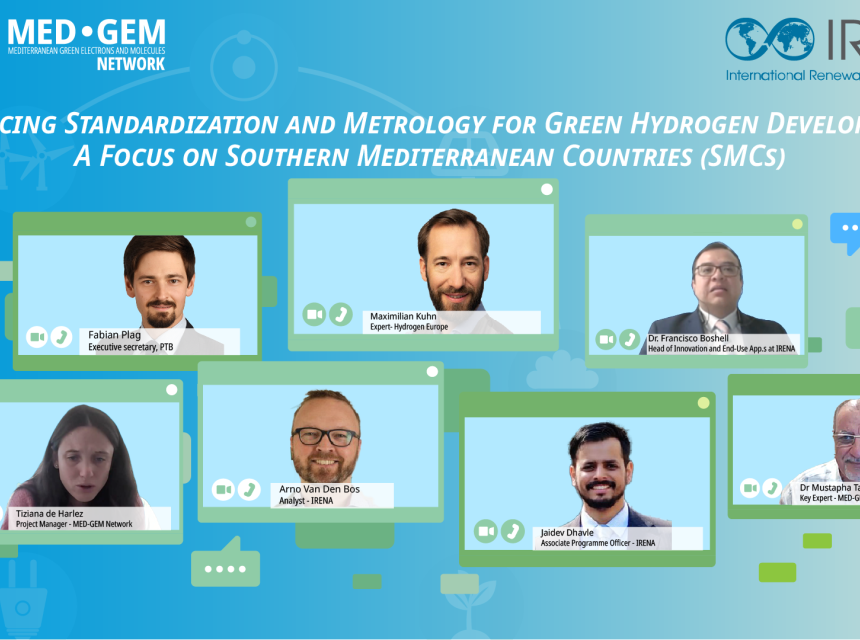Advancing Green Hydrogen: Building Regional Momentum Through Standardization and Metrology

Advancing Green Hydrogen: Building Regional Momentum Through Standardization and Metrology
Green hydrogen has emerged as a critical enabler of energy transitions worldwide, offering a pathway toward decarbonization, energy security, and new economic opportunities. To facilitate the integration of green hydrogen into both local and international markets, the International Renewable Energy Agency (IRENA) and the MED-GEM Network hosted a webinar on November 28, 2024, highlighting the indispensable role of standardization and metrology. The event provided a platform for experts to discuss actionable pathways for advancing these frameworks in Southern Mediterranean Countries (SMCs).
👨🏽💻 Watch the presentation
Session 1: Advancing Standardisation for Green Hydrogen and its derivatives in SMCs
"Achieving the Paris Agreement’s 1.5°C target requires 500 GW of electrolyzer capacity by 2030," stated Dr. Francisco Boshell, Head of Innovation and End-Use Applications at IRENA. He highlighted the significant investments required in renewable energy and infrastructure, stressing the risks posed by weak quality assurance mechanisms in green hydrogen value chains.
Building a Strong Quality Infrastructure
To address these gaps, Jaidev Dhavle, Associate Programme Officer, presented IRENA’s Quality Infrastructure Roadmap for Green Hydrogen, developed in collaboration with PTB (Germany’s Metrology Institute) and the Federal Minister for Economic Cooperation and Development of Germany.
The roadmap outlines essential components, including:
- Technical standards for production, storage, and trade.
- Conformity assessments such as certification, testing, and inspection.
- Metrology to ensure accurate and uniform measurements.
Tunisia serves as a case in point. While it has ambitious plans to export 8 million tonnes of green hydrogen by 2050, aligning with international standards remains a challenge. Without proper certification frameworks and metrology infrastructure, Tunisia risks losing credibility in global markets, underscoring the necessity of adopting comprehensive quality systems.
The Southern Mediterranean Perspective: Regional Cooperation as a Catalyst
SMCs possess the renewable resources and geographic proximity to Europe to excel in the hydrogen economy. However, as Dr. Mustapha Taoumi , Deputy Director to the MED-GEM Network noted, the region faces persistent hurdles, including insufficient metrology infrastructure, misaligned regulatory frameworks, and limited coordination between ministries.
One proposed solution is "smart specialization", where countries collaborate to pool expertise:
- Tunisia could focus on hydrogen purity testing.
- Morocco could specialize in storage protocols.
- Egypt could lead on transport safety standards.
"Collaboration is not optional; it’s essential for reducing redundancy and enhancing global competitiveness," emphasized Dr. Taoumi. Regional cooperation would streamline efforts, reduce costs, and improve access to global markets.
Lessons from Europe: Harmonizing Standards to Enable Trade
The European Union’s approach to standardization provides a valuable model for SMCs. Dr. Maximilian Kuhn, Advisor, Funding & Intelligence at Hydrogen Europe stressed the importance of harmonizing technical regulations to prevent market fragmentation. He highlighted the Digital Product Passport (DPP) as a vital tool for ensuring traceability and compliance.
"It’s not just about producing green hydrogen; it’s about proving it meets global standards," Kuhn remarked. Fragmented certification systems remain a significant challenge, as varying carbon intensity thresholds across jurisdictions can hinder trade. By aligning with ISO standards and adopting tools like the DPP, SMCs can overcome these barriers and build trust with international markets.
Recommendations for SMCs
To advance green hydrogen standardization, speakers proposed several critical actions:
- Capacity Building and Training: Equip local institutions with expertise in metrology, testing, and certification.
- International Collaboration: Actively participate in global technical committees, such as ISO and IEC, to ensure alignment with best practices.
- Regional Platforms: Establish regional frameworks to address common challenges and foster cross-border trade.
- Infrastructure Investments: Develop testing labs and metrology systems tailored to hydrogen’s unique properties, such as flammability and purity requirements.
Session 2: Actionable Pathways for Standardisation, Certification, and Metrology in SMCs
Behind the hype surrounding green hydrogen lies an intricate web of challenges: How do we guarantee the quality of hydrogen? How do we ensure its safe transport across borders? How do we create trust in its sustainability claims? The answer, as underscored by experts, lies in metrology (the science of measurement) and standardization—often-overlooked pillars that underpin every successful hydrogen economy.
The Unseen Foundation: Why Standards Matter
Dr. Fabian Plag, Executive Secretary of the Innovation Cluster for Energy of PTB Germany put it succinctly: “Without reliable measurements, hydrogen trade and innovation simply cannot happen.” Whether it’s testing hydrogen purity or calibrating equipment to meet international standards, metrology transforms hydrogen from a theoretical energy carrier to a tangible, tradable commodity. Yet for many Southern Mediterranean countries, this foundation is still under construction. The lack of testing infrastructure, qualified experts, and harmonized standards poses a significant barrier. These gaps are not merely technical—they risk delaying the region’s entry into the lucrative global hydrogen market.
Regional Cooperation: A Shortcut to Progress
Given these challenges, regional collaboration emerged as a key theme during the webinar. The concept of “smart specialization”—where countries pool resources and expertise to develop complementary capabilities—was presented as a pragmatic solution.
Imagine a Southern Mediterranean network where Tunisia leads on hydrogen purity testing, Morocco specializes in storage protocols, and Egypt advances transport safety standards. This kind of cooperative model, as Dr. Plag suggested, would accelerate progress, reduce redundancy, and enhance the region’s collective bargaining power in international trade.
But collaboration isn’t without its hurdles. Political sensitivities, energy security concerns, and differing priorities among countries could slow down this vision. Yet the panelists remained optimistic: with the right frameworks and shared vision, the Southern Mediterranean can overcome these barriers and leapfrog into a leadership position.
The Elephant in the Room: Certification and Trade
One of the most pressing challenges highlighted was the fragmentation of certification standards. Across the globe, jurisdictions apply different carbon intensity thresholds and sustainability criteria for green hydrogen. A molecule of hydrogen deemed “green” in one country could fail to meet the criteria in another.
For Southern Mediterranean exporters, this lack of harmonization spells trouble. As Dr. Arno van den Bos , Analyst at IRENA explained, “Without aligned standards, the region risks losing its competitive edge before it even enters the market.”
Tools like the ISO 19870:2023 Technical Standard and the Digital Product Passport were presented as pathways to resolve these disparities. By adopting these frameworks, the region can simplify compliance, build trust with global partners, and ensure its hydrogen products meet international expectations.
What Needs to Happen Next?
The roadmap for the Southern Mediterranean is clear:
- Build the Basics by investing in testing laboratories, metrology systems, and technical training to address immediate gaps.
- Align with Global Standards with active participation in international standardization bodies like ISO and IEC to ensure the region’s voice is heard and its needs are met.
- Collaborate Regionally to establish cross-border platforms to share resources, harmonize regulations, and foster collective growth.
- Create Awareness to Drive home the importance of standardization and metrology to policymakers, businesses, and the public. Without buy-in at all levels, progress will stall.
A Regional Call to Action
The Southern Mediterranean stands at a crossroads. The potential is immense, but so are the challenges. The question isn’t whether green hydrogen will play a role in the region’s future—it’s whether the region can act fast enough to seize its opportunity.
As Dr. Mustapha Taoumi of MED-GEM aptly stated during the webinar: “Standardization and metrology are not just technical frameworks; they are the tools that turn vision into reality.”
The global energy transition is already underway, and the Southern Mediterranean has the chance to be a leader—not a follower. The time to act is now.

